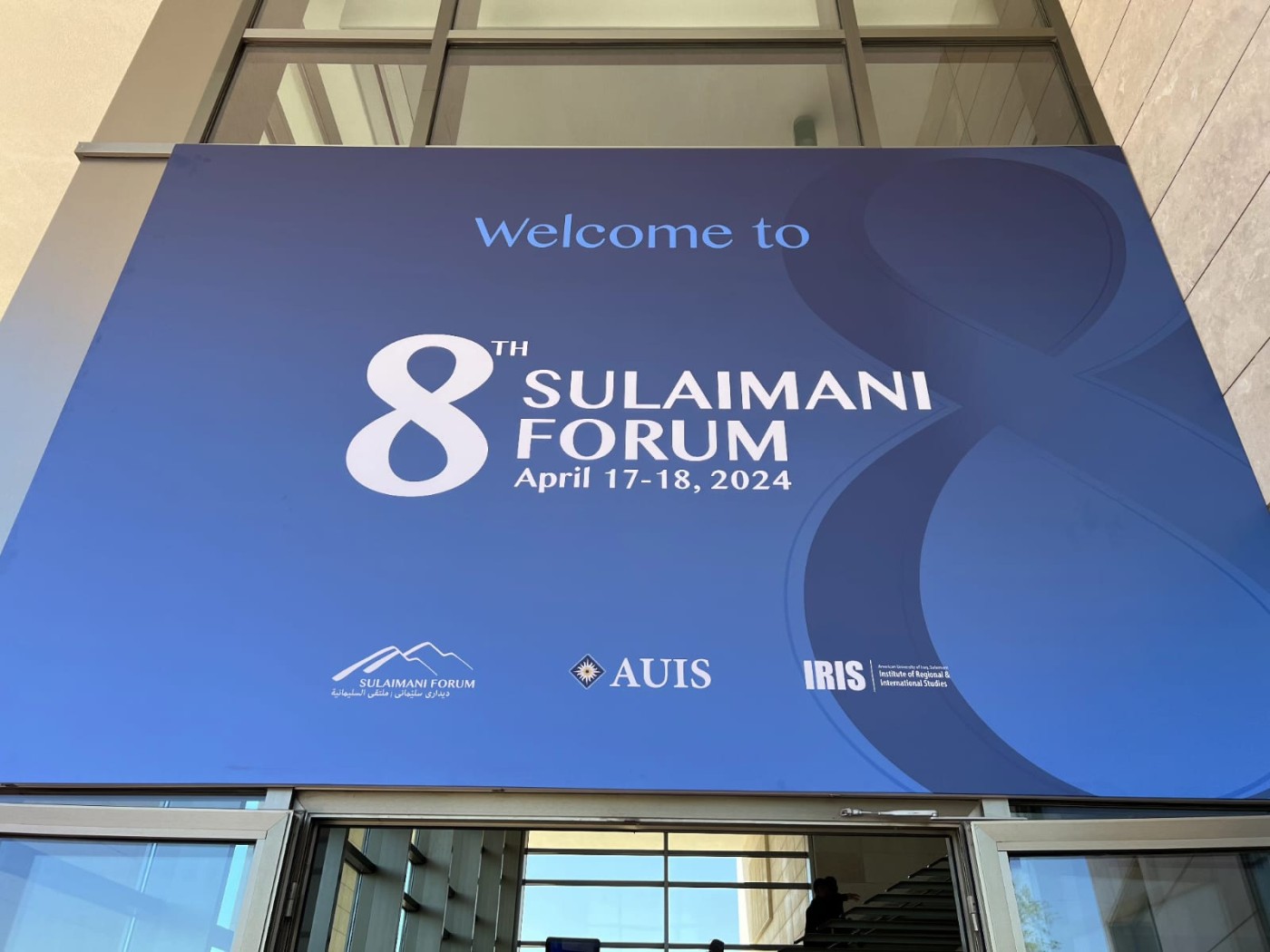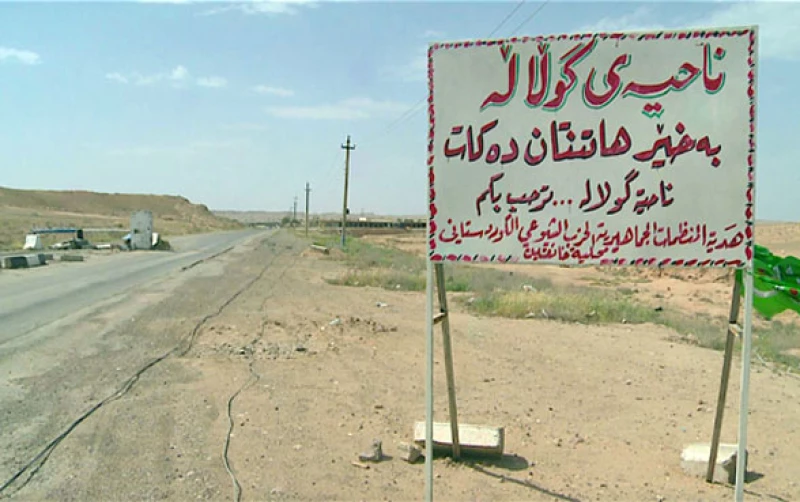SULAIMANI, Kurdistan Region of Iraq - The Sulaimani province hosted the opening day of the eighth Sulaimani Forum (Suli Forum) on Wednesday, welcoming numerous prominent Iraqi and regional political figures who discussed a variety of significant issues concerning Iraq and the broader region.
In a series of statements made on Wednesday, political figures from Iraq and the Kurdistan Region addressed various issues concerning the region’s political, security, and economic landscape.
Ammar al-Hakim, head of the National Wisdom Movement, highlighted Iran’s strategic use of drones and missiles in its response to Israel. "The operation was designed to alert the international community without escalating tensions further", he emphasized Iran’s right to respond.
#Iran’s goal was not to escalate the conflict further, hence they informed the regional neighbors ahead of time and performed an attack that would take several hours, head of the National Wisdom Movement Ammar al-Hakim said at #SuliForum24#TheNewRegion pic.twitter.com/pN9XsHHZ1e
— The New Region (@thenewregion) April 17, 2024
Nechirvan Barzani, President of the Kurdistan Region, pointed out "the absence of dialogue among political parties as a key factor allowing terrorist groups to infiltrate the country." He advocated for the establishment of an independent Palestinian state as the sole path to peace in the region.
The people of the #Kurdistan Region are united, and political parties need to come to an agreement the way their people have, Kurdistan Region President Nechirvan Barzani said at #SuliForum24 stressing the importance of holding parliamentary elections.#TheNewRegion pic.twitter.com/lYY8WyZGwT
— The New Region (@thenewregion) April 17, 2024
Iraq’s National Security Advisor, Qasim al-Aaraji, expressed confidence in the stability of Iraq’s relations with the U.S., regardless of changes in its government, due to a comprehensive bilateral agreement. He also noted the importance of Iraq’s strategic location as a point of convergence for both Iran and the U.S.
Rebar Ahmed, the Interior Minister of the Kurdistan Region, stated that there is nothing in the Iraqi constitution called the central government as it only stipulates the existence of a federal government.
There is nothing in the #Iraqi constitution called the central government. The constitution stipulates the existence of a federal government.
— The New Region (@thenewregion) April 17, 2024
Rebar Ahmed, Minister of Interior, Kurdistan Regional Government #SuliForum24#TheNewRegion pic.twitter.com/mQFFfD3ijt
Qubad Talabani, Deputy Prime Minister of the Kurdistan Regional Government, lamented "the lack of true statesmanship in Iraq, which is necessary for building a robust economy that doesn’t solely rely on oil." He expressed his desire for the end of oil dependency, which he considers a curse, and cautioned against "the rising threat of hackers in the era of artificial intelligence."
It's important to have some institutions that prevent misuse of technology.
— The New Region (@thenewregion) April 17, 2024
Qubad Talabani, Deputy Prime Minister, Kurdistan Regional Government said at #SuliForum24 pic.twitter.com/CxwbMAw7Po
Lastly, Khaled Battal, Iraq’s Minister of Industry, cast doubt on solving the country’s electricity crisis under the current government’s direction. He then criticized the ongoing public sector employment in an oil-dependent economy and highlighted "the government’s reluctance to present a budget draft with an 80 trillion dinar deficit to parliament."
It's no secret that there is a deficit of 80 trillion in the draft law, and we hesitate to send it to the Parliament.
— The New Region (@thenewregion) April 17, 2024
Khaled Battal, Al-Najm Minister of Industry and Minerals, Government of Iraq said at #SuliForum24 pic.twitter.com/efd47RO2s7
The first day of Suli Forum concluded with statements that underscore the intricate challenges facing Iraq and the Kurdistan Region, from governance and economic dependence to regional stability and security concerns.
The eighth Suli Forum continued its activities on its second day on Thursday, with participants including a diverse array of researchers and political figures from both local and international spheres, representing countries such as the United States, Russia, and China.
During today's sessions, a wide range of topics were addressed, spanning from pressing environmental challenges and climate change to the role of international aid in conflict areas. Discussions also delved into the future trajectory of Iraq's political landscape against the backdrop of the region's complex geopolitical dynamics.
Elena Suponina, an Advisor at the Russian International Affairs Council, underscored the imperative of unity for Iraq's resilience, affirming, "We say to Iraq that it should be strong, and it can be strong if it stands as one."
We say to #Iraq that it should be strong, and it can be strong if it is unified, Advisor at Russian International Affairs Council Elena Suponina said at #SuliForum24 #TheNewRegion pic.twitter.com/na2v7czacD
— The New Region (@thenewregion) April 18, 2024
Highlighting the glaring disparity between population size and access to essential resources, Sameh al-Muqdadi, a Senior Fellow at the Institute of Regional and International Studies (IRIS), pointed out, "The MENA region, of which Iraq is a part, represents 6% of the global population but possesses a mere 2% of fresh water resources."
The #MENA region has only two percent of the global fresh water resources, Senior Fellow at the Institute of Regional and International Studies (IRIS) Sameh al-Muqdadi said at the #SuliForum24 #TheNewRegion pic.twitter.com/fcTVb72hSt
— The New Region (@thenewregion) April 18, 2024
Reflecting on past conflicts within Iraq, Ali Taher Alhammood, Managing Director of the Al-Bayan Center for Planning and Studies, lamented, "Previous Iraqi governments' clashes with Kurds created a strategic internal void, transforming Iraq into a battleground for external and regional influence." Thanassis Cambanis, Director of Century International, emphasized the enduring nexus between Iraq and Iran, asserting, "Iran's presence in Iraq is a natural outcome rooted in geography, historical ties, and religious bonds."
Previous #Iraqi governments fighting with #Kurds created a strategic internal vacuum in Iraq, turning Iraq into a battleground for the influence of others and regional states, Managing Director of Al-Bayan Center for Planning and Studies, @Ali_alhammood said at #SuliForum24… pic.twitter.com/m9Enbg07FX
— The New Region (@thenewregion) April 18, 2024
Nooralhuda Saad, Head of SASA Organization, voiced concerns over governmental edicts limiting collaboration with civil society institutions, lamenting, "Decisions have been issued by the government that inhibit engagement with civil society." While Zaid Al-Ali, Senior Programme Manager at International IDEA, highlighted challenges to the judiciary, noting, "The Federal Supreme Court's aggressive rulings have spurred public scrutiny of its legitimacy."
You have the Federal Supreme Court that is issuing aggressive decisions, and leading to people openly challenging the legitimacy of the court, Senior Programme Manager, International IDEA, @zalali said at #SuliForum24 #TheNewRegion pic.twitter.com/pdO62xned0
— The New Region (@thenewregion) April 18, 2024
Thomas Seiler, Ambassador of the European Union to Iraq, expressed commitment to Iraq's economic prosperity, affirming, "We seek to partner with Iraq's economy and banks to unlock its inherent potential and foster private sector growth." While Lahib Higel, Senior Analyst for Iraq at International Crisis Group, shed light on the breakdown of public order, observing, "Desperation has led to chaos, with aid convoys being overrun or targeted by violence."
Public order has broken down to the degree that desperate people are either running over the aids convoys that actually make it in, or that are shot at, Senior Analyst for Iraq, International Crisis Group, @LahibHigel said at the #SuliForum24 #TheNewRegion pic.twitter.com/HROHp7KYxC
— The New Region (@thenewregion) April 18, 2024
Sameh al-Muqdadi, once again, shed light on regional dynamics, noting, "Budgetary allocations are a pressing concern in Kurdistan, while pollution poses a paramount challenge in Basra." Along the same lines, Aoun Diab, Iraqi Minister of Water Resources, sounded a clarion call on water scarcity, warning, "By 2035, water shortages in excess of 10 billion cubic meters will imperil our resources."
By 2035, there will be a shortage exceeding 10 billion cubic meters in water resources, Iraqi Minister of Water Resources Aoun Diab said at the #SuliForum24 #TheNewRegion pic.twitter.com/Xi8LrpX5lw
— The New Region (@thenewregion) April 18, 2024
The forum concluded today, marking a significant milestone in fostering dialogue and understanding on pressing issues facing Iraq and the wider region. The New Region was present at Suli forum 2024, with its team actively participating in discussions and providing live coverage through its opinion hub, featuring insights from some of the key speakers.



 Facebook
Facebook
 LinkedIn
LinkedIn
 Telegram
Telegram
 X
X


